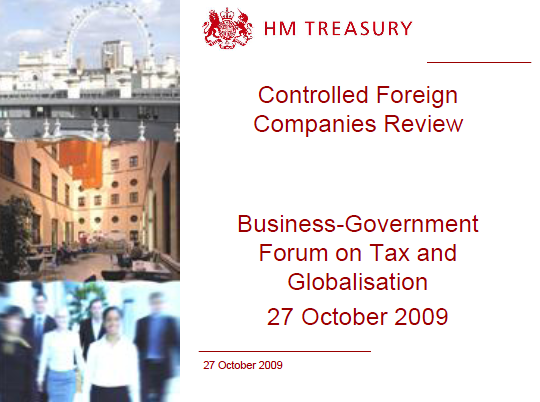 Business-Government Forum on Tax and Globalisation
Business-Government Forum on Tax and Globalisation
- 7 pages
- Restricted
- October 27, 2009
OUTLINE
1. Recap
2. Progress
3. Emerging thinking
4. Questions for forumRe-cap
PBR 2008 –FST open letter“The introduction of dividend exemption represents a move towards a more territorial system of taxing foreign subsidiaries so that a new CFC system should not tax profits that are genuinely earned in overseas subsidiaries. While we still want to counteract the artificial diversion of profits from the UK, the CFC rules, should achieve this in a way that reflects modern business practice.“
Reason for review
•UK needs CFC rules, but must keep pace with changing economy.
•Current rules are viewed by business as outdated, overly complex and uncertain.
•Overall aim to enhance UK competitiveness, while providing adequate protection of the UK tax base.Progress
Stakeholder engagement strategy (June 2009)
•Facilitate open and transparent approach to reform
•High-level timetable for reform (document around end 2009, legislating FB 2011)Policy principles document (July 2009)
•To provide business with some certainty as to future direction of travel
•Objectives for reform
•balance competitiveness with tax base protection
•simplicity and certainty;
•align rules with the reality of modern business so that commercial transactions are not hindered or unnecessarily complicated.
•EU complianceQuestionnaire (September 2009)
•Views from cross-section of businessesEmerging thinking on money and IP
•Business agree that money and IP are the key areas to resolve.
•Working groups held to discuss issues and consider options to address artificial diversion.
•Issues arising onmoney:
•Treatment of group financing and treasury activities.
•New regime should better recognise the commercial drivers for treasury and finance operations.
•While recognising the risk to UK tax base from diversion, business want flexibility to manage their global tax rate.
•Issues arising onIP:
•New regime should recognise that IP may be held offshore as an active part of business, not only as a passive investment.
•A major risk to UK tax base can arise on transfer of IP from UK.Emerging thinking on overall shape of new regime
•Entity v Income
•Balance between objective and purposive approachesObjective approachwould work by designing simple tests as proxies for artificial diversion from the UK Purposive approachwould work by having an over-riding principle that would apply to profits held in low tax jurisdictions
•Based on feedback from working groups, questionnaires and wider business consultation, preferred shape of new regime:
•Entity rather than income basis, but moving away from an ‘all or nothing’ approach
•Prefer to start with simple/certain objective tests, reducing pressure on subjective purpose based test
•Avoid tracing rulesQuestions for discussion
•What are the forum members’ views on emerging thinking from the review?
•Given the objectives for the reform, is this the best way to target artificial diversion of profits from the UK?
•How best can we manage uncertainty during consultation?
